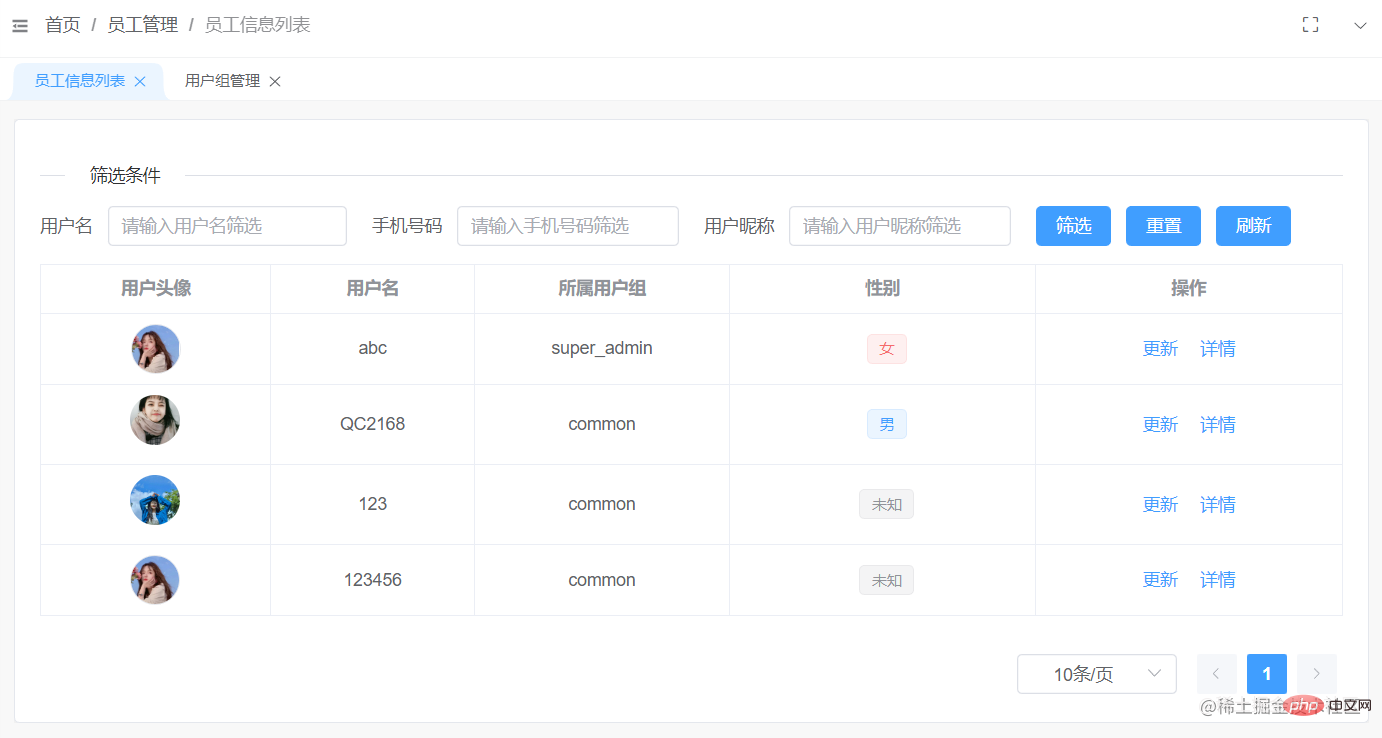Home >Web Front-end >Vue.js >Vue3 writes the list page like this to make the performance better and more efficient!
Vue3 writes the list page like this to make the performance better and more efficient!
- 青灯夜游Original
- 2022-12-23 19:23:592553browse
In the process of developing the management backend, you will definitely encounter a lot of addition, deletion, modification and query pages, and most of the logic of these pages are the same. This will lead to an increasing degree of code coupling. Below, we will Reusable data is extracted into hooks, which not only solves the problem of coupling but also improves work efficiency.

In the process of developing the management backend, you will definitely encounter a lot of add, delete, modify and query pages, and the logic of these pages is mostly the same, such as obtaining list data, Basic functions such as paging and filtering functions. The difference is the data items presented. There are also some action buttons. [Related recommendations: vuejs video tutorial, web front-end development]

For when there are only 1 or 2 pages at the beginning Most developers may directly copy the previous page code and create an additional copy. As the project progresses, the number of similar pages may increase, which directly leads to an increasing degree of coupling of the project code.
This is also one of the main reasons why some reusable functions or components should be extracted from the project
Below, we encapsulate a general useList, Adapted to most list pages of additions, deletions, modifications, and queries, allowing you to complete tasks faster and more efficiently, and get off work on time~

Pre-requisite knowledge
Encapsulation
We need to extract some common parameters and functions and encapsulate them into a common hook, it will be easier and more convenient to reuse the same function on other pages later.
Define the essential paging data for the list page
export default function useList() {
// 加载态
const loading = ref(false);
// 当前页
const curPage = ref(1);
// 总数量
const total = ref(0);
// 分页大小
const pageSize = ref(10);
}How to get the list data
Think about it and let the useList function receive a listRequestFn parameter, used to request data in the list.
Define a list variable to store the data content returned by the network request. Since the list data type cannot be determined directly internally, the list data type is provided externally through generics.
export default function useList<ItemType extends Object>(
listRequestFn: Function
) {
// 忽略其他代码
const list = ref<ItemType[]>([]);
}Create a loadData function in useList to call the data acquisition function. This function receives a parameter to obtain the specified number of pages of data (optional , defaults to the value of curPage).
- Execution process
- Set the loading status
- Call the external function and assign the obtained data to the
listandtotal - Close the loading state
The async/await syntax is used here, assuming that the request error or deconstruction error will occur catch code block, and then close the loading state
You need to pay attention here to whether the number and type of parameters received by the incoming listRequestFn function correspond properly. Please adjust according to the actual situation
export default function useList<ItemType extends Object>(
listRequestFn: Function
) {
// 忽略其他代码
// 数据
const list = ref<ItemType[]>([]);
// 过滤数据
// 获取列表数据
const loadData = async (page = curPage.value) => {
// 设置加载中
loading.value = true;
try {
const {
data,
meta: { total: count },
} = await listRequestFn(pageSize.value, page);
list.value = data;
total.value = count;
} catch (error) {
console.log("请求出错了", "error");
} finally {
// 关闭加载中
loading.value = false;
}
};
}Don’t forget, there is also switching paging to handle
Use the watch function to monitor the data, when curPage, When the value of pageSize changes, call the loadData function to obtain new data.
export default function useList<ItemType extends Object>(
listRequestFn: Function
) {
// 忽略其他代码
// 监听分页数据改变
watch([curPage, pageSize], () => {
loadData(curPage.value);
});
}Basic list data acquisition is now implemented
Implementing data filter
In a huge data list, data filtering is an essential function
Usually, I will define the filter condition field in a ref, and just throw ref to the request function when requesting.
In the useList function, the second parameter receives a filterOption object, corresponding to the filter condition field in the list.
Adjust the loadData function and pass in the filterOption object in the request function
Note that the incoming listRequestFn function receives Whether the number and type of parameters correspond to each other normally Please adjust according to the actual situation
export default function useList<
ItemType extends Object,
FilterOption extends Object
>(listRequestFn: Function, filterOption: Ref<Object>) {
const loadData = async (page = curPage.value) => {
// 设置加载中
loading.value = true;
try {
const {
data,
meta: { total: count },
} = await listRequestFn(pageSize.value, page, filterOption.value);
list.value = data;
total.value = count;
} catch (error) {
console.log("请求出错了", "error");
} finally {
// 关闭加载中
loading.value = false;
}
};
}Note that the filterOption parameter type here needs to be the ref type, otherwise the responsiveness will be lost and cannot work properly
Clear the filter Filter field
In the page, there is a reset button to clear the filter conditions. This repeated action can be handled by the reset function.
Set all values to undefined by using Reflect, and then request the data again.
什么是 Reflect?看看这一篇文章Reflect 映射对象
export default function useList<
ItemType extends Object,
FilterOption extends Object
>(listRequestFn: Function, filterOption: Ref<Object>) {
const reset = () => {
if (!filterOption.value) return;
const keys = Reflect.ownKeys(filterOption.value);
filterOption.value = {} as FilterOption;
keys.forEach((key) => {
Reflect.set(filterOption.value!, key, undefined);
});
loadData();
};
}导出功能
除了对数据的查看,有些界面还需要有导出数据功能(例如导出 csv,excel 文件),我们也把导出功能写到useList里
通常,导出功能是调用后端提供的导出Api获取一个文件下载地址,和loadData函数类似,从外部获取exportRequestFn函数来调用Api
在函数中,新增一个exportFile函数调用它。
export default function useList<
ItemType extends Object,
FilterOption extends Object
>(
listRequestFn: Function,
filterOption: Ref<Object>,
exportRequestFn?: Function
) {
// 忽略其他代码
const exportFile = async () => {
if (!exportRequestFn) {
throw new Error("当前没有提供exportRequestFn函数");
}
if (typeof exportRequestFn !== "function") {
throw new Error("exportRequestFn必须是一个函数");
}
try {
const {
data: { link },
} = await exportRequestFn(filterOption.value);
window.open(link);
} catch (error) {
console.log("导出失败", "error");
}
};
}注意,传入的 exportRequestFn 函数接收的参数数量和类型是否正常对应上 请根据实际情况进行调整
优化
现在,整个useList已经满足了页面上的需求了,拥有了获取数据,筛选数据,导出数据,分页功能
还有一些细节方面,在上面所有代码中的try..catch中的catch代码片段并没有做任何的处理,只是简单的console.log一下
提供钩子
在useList新增一个 Options 对象参数,用于函数成功、失败时执行指定钩子函数与输出消息内容。
定义 Options 类型
export interface MessageType {
GET_DATA_IF_FAILED?: string;
GET_DATA_IF_SUCCEED?: string;
EXPORT_DATA_IF_FAILED?: string;
EXPORT_DATA_IF_SUCCEED?: string;
}
export interface OptionsType {
requestError?: () => void;
requestSuccess?: () => void;
message: MessageType;
}
export default function useList<
ItemType extends Object,
FilterOption extends Object
>(
listRequestFn: Function,
filterOption: Ref<Object>,
exportRequestFn?: Function,
options? :OptionsType
) {
// ...
}设置Options默认值
const DEFAULT_MESSAGE = {
GET_DATA_IF_FAILED: "获取列表数据失败",
EXPORT_DATA_IF_FAILED: "导出数据失败",
};
const DEFAULT_OPTIONS: OptionsType = {
message: DEFAULT_MESSAGE,
};
export default function useList<
ItemType extends Object,
FilterOption extends Object
>(
listRequestFn: Function,
filterOption: Ref<Object>,
exportRequestFn?: Function,
options = DEFAULT_OPTIONS
) {
// ...
}在没有传递钩子的情况霞,推荐设置默认的失败时信息显示
优化loadData,exportFile函数
基于 elementui 封装 message 方法
import { ElMessage, MessageOptions } from "element-plus";
export function message(message: string, option?: MessageOptions) {
ElMessage({ message, ...option });
}
export function warningMessage(message: string, option?: MessageOptions) {
ElMessage({ message, ...option, type: "warning" });
}
export function errorMessage(message: string, option?: MessageOptions) {
ElMessage({ message, ...option, type: "error" });
}
export function infoMessage(message: string, option?: MessageOptions) {
ElMessage({ message, ...option, type: "info" });
}loadData 函数
const loadData = async (page = curPage.value) => {
loading.value = true;
try {
const {
data,
meta: { total: count },
} = await listRequestFn(pageSize.value, page, filterOption.value);
list.value = data;
total.value = count;
// 执行成功钩子
options?.message?.GET_DATA_IF_SUCCEED &&
message(options.message.GET_DATA_IF_SUCCEED);
options?.requestSuccess?.();
} catch (error) {
options?.message?.GET_DATA_IF_FAILED &&
errorMessage(options.message.GET_DATA_IF_FAILED);
// 执行失败钩子
options?.requestError?.();
} finally {
loading.value = false;
}
};exportFile 函数
const exportFile = async () => {
if (!exportRequestFn) {
throw new Error("当前没有提供exportRequestFn函数");
}
if (typeof exportRequestFn !== "function") {
throw new Error("exportRequestFn必须是一个函数");
}
try {
const {
data: { link },
} = await exportRequestFn(filterOption.value);
window.open(link);
// 显示信息
options?.message?.EXPORT_DATA_IF_SUCCEED &&
message(options.message.EXPORT_DATA_IF_SUCCEED);
// 执行成功钩子
options?.exportSuccess?.();
} catch (error) {
// 显示信息
options?.message?.EXPORT_DATA_IF_FAILED &&
errorMessage(options.message.EXPORT_DATA_IF_FAILED);
// 执行失败钩子
options?.exportError?.();
}
};useList 使用方法
<template>
<el-collapse>
<el-collapse-item title="筛选条件" name="1">
<el-form label-position="left" label-width="90px" :model="filterOption">
<el-row :gutter="20">
<el-col :xs="24" :sm="12" :md="8" :lg="8" :xl="8">
<el-form-item label="用户名">
<el-input
v-model="filterOption.name"
placeholder="筛选指定签名名称"
/>
</el-form-item>
</el-col>
<el-col :xs="24" :sm="12" :md="8" :lg="8" :xl="8">
<el-form-item label="注册时间">
<el-date-picker
v-model="filterOption.timeRange"
type="daterange"
unlink-panels
range-separator="到"
start-placeholder="开始时间"
end-placeholder="结束时间"
format="YYYY-MM-DD HH:mm"
value-format="YYYY-MM-DD HH:mm"
/>
</el-form-item>
</el-col>
<el-col :xs="24" :sm="24" :md="24" :lg="24" :xl="24">
<el-row class="flex mt-4">
<el-button type="primary" @click="filter">筛选</el-button>
<el-button type="primary" @click="reset">重置</el-button>
</el-row>
</el-col>
</el-row>
</el-form>
</el-collapse-item>
</el-collapse>
<el-table v-loading="loading" :data="list" border style="width: 100%">
<el-table-column label="用户名" min-width="110px">
<template #default="scope">
{{ scope.row.name }}
</template>
</el-table-column>
<el-table-column label="手机号码" min-width="130px">
<template #default="scope">
{{ scope.row.mobile || "未绑定手机号码" }}
</template>
</el-table-column>
<el-table-column label="邮箱地址" min-width="130px">
<template #default="scope">
{{ scope.row.email || "未绑定邮箱地址" }}
</template>
</el-table-column>
<el-table-column prop="createAt" label="注册时间" min-width="220px" />
<el-table-column width="200px" fixed="right" label="操作">
<template #default="scope">
<el-button type="primary" link @click="detail(scope.row)"
>详情</el-button
>
</template>
</el-table-column>
</el-table>
<div v-if="total > 0" class="flex justify-end mt-4">
<el-pagination
v-model:current-page="curPage"
v-model:page-size="pageSize"
background
layout="sizes, prev, pager, next"
:total="total"
:page-sizes="[10, 30, 50]"
/>
</div>
</template>
<script setup>
import { UserInfoApi } from "@/network/api/User";
import useList from "@/lib/hooks/useList/index";
const filterOption = ref<UserInfoApi.FilterOptionType>({});
const {
list,
loading,
reset,
filter,
curPage,
pageSize,
reload,
total,
loadData,
} = useList<UserInfoApi.UserInfo[], UserInfoApi.FilterOptionType>(
UserInfoApi.list,
filterOption
);
</script>本文useList的完整代码在 github.com/QC2168/snip…
The above is the detailed content of Vue3 writes the list page like this to make the performance better and more efficient!. For more information, please follow other related articles on the PHP Chinese website!
Related articles
See more- Can vue's mix-in use life cycle?
- This article talks about the three stages of the Vue component life cycle (creation, running and destruction)
- How to query the current vue version
- [Organization and sharing] 7 practical JS libraries available on vue projects
- An article explains in detail how to differentiate the project according to the vue version

